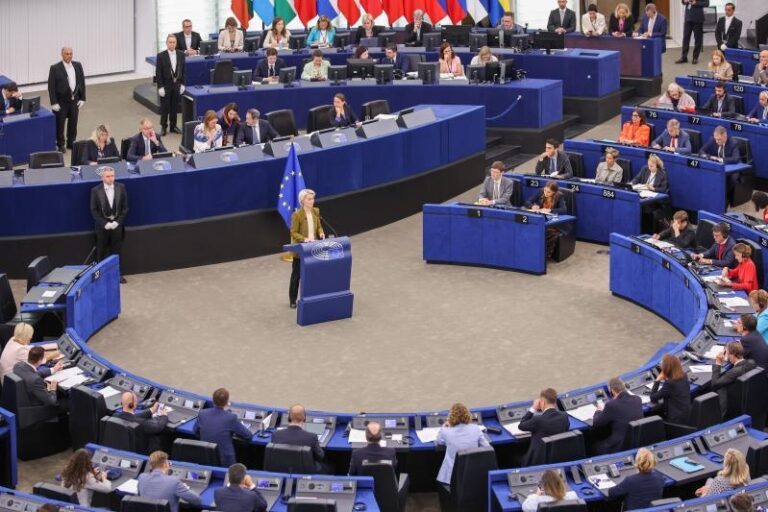Europe's Competitiveness Challenge: Rhetoric vs. Reality


European Commission President Ursula von der Leyen’s September 10, 2025, State of the Union address seemingly ticked all the right boxes, but really satisfied no one. Is there a coherent, inspiring, and future-oriented vision behind the rhetoric designed to please everyone?
The topic most important for businesses and citizens alike – Europe’s competitiveness – was prominently featured in the address, rightly positioned as crucial for European independence amid intensifying geopolitical tensions. However, a closer examination of Madame President’s concrete proposals raises serious questions about their practical effectiveness and willingness to carry them through.
The Draghi Report: A Stark Warning Ignored?
Exactly a year before Van Der Leyen’s speech, Mario Draghi published his influential report on European competitiveness, identifying key barriers hampering the continent’s economic development. Among the most critical problems he highlighted were market fragmentation, excessive bureaucracy, overregulation, and lack of risk capital for innovative enterprises.
While von der Leyen references “key bottlenecks identified by the Draghi report,” her response so far is disappointingly inadequate. The promised €8 billion annual reduction in bureaucratic costs sounds significant, but represents a drop in the ocean for the EU’s entire economy. Meanwhile, fundamental issues like financial market fragmentation and capital flow barriers still await systemic solutions. Next to nothing was done to deregulate and lessen the burdens and red tape that are holding down European companies and innovators. The omnibus packages so far were only window dressing – why would the next ones be any different? What will it take for the Brussels bureaucracy to change its “regulate now – ask questions later” attitude?
AI Ambitions: Big Words, Small Actions
We can only agree with Von der Leyen when she emphasized that “a European AI is essential for our future independence,” announcing investments in European “AI Gigafactories” and support for startups developing next-generation AI models. While this sounds impressive, the details remain frustratingly vague. No specific investment amounts, implementation timelines, or mechanisms were provided to ensure European tech startups won’t continue migrating overseas in search of better capital and development conditions.
AI also needs energy, and Europe has the most expensive energy in the world, mostly due to excessive and highly politicized regulations. There is little in the #SOTEU to give us hope this is going to change.
The announcement of a “multi-billion euro Scaleup Europe Fund” represents a step forward, but again lacks specifics. How many billions exactly? When will it launch? What selection criteria will apply? These fundamental questions went unanswered.
Bright Spots in the Reform Agenda
Not everything deserves criticism. The announcement of doubling the Horizon Europe budget signals that the Union takes research and innovation seriously. This concrete action could genuinely impact European science and technology competitiveness.
Equally positive is the promised introduction of the so-called 28th legal regime – a proposal from Enrico Letta’s single market report. This mechanism would allow companies to operate under one set of rules across the entire EU, significantly simplifying European-scale business operations.
Vision or Wishful Thinking?
Von der Leyen presented an ambitious narrative about Europe’s “Independence Moment,” but it lacks a coherent implementation strategy. The speech overflows with generic slogans like “faster, smarter and more European,” while concrete mechanisms remain unspecified.
The approach to artificial intelligence proves particularly problematic. While the United States and China invest tens of billions of dollars in AI development, Europe continues operating in millions of euros and speaks of “private sector cooperation.” This scale difference could prove decisive.
Between Aspirations and Reality
Europe faces a real choice: does it want to be a global technology leader or settle for the role of regulator and observer? Von der Leyen’s address suggests the former, but the proposed measures and track record so far point toward the latter.
Timing remains the crucial issue. The President correctly noted that “2030 is tomorrow,” but most of her proposals are long-term and require complex legislative procedures. Meanwhile, technological competition unfolds in real-time, and Europe cannot afford multi-year implementation delays for crucial reforms. There is very little on the table that actually serves to improve our competitive position, and the Brussels law machine continues to churn out new regulations that actually are making it worse.
Europe’s “Independence Moment” makes for an appealing slogan, but its realization will require a much steadfast resolve to fight the interests entrenched in Brussels, and far more concrete actions than those von der Leyen presented. Without fundamental changes in approach to innovation, financing, and bureaucracy, Europe risks remaining an observer of the global technological revolution rather than its co-creator.
We were not fully convinced that Ursula von der Leyen has a clear vision, and most of all will deliver on the promise of a more competitive Union, supportive of technology and innovation – were you? Give us your thoughts below in the comments?
Photographer: Christophe Licoppe
· More articles

The Artificial Intelligence Act was passed in the European Parliament
The EU’s artificial intelligence legislation will be enforced later this year, setting a global standard for other governments grappling with regulating this rapidly evolving technology. This is a milestone, but only the beginning. – Our ground-breaking AI law will allow us to be world leaders in digital and tech innovation based on EU democratic […]

Consultation time regarding the AI Act
The Artificial Intelligence Act is the world’s first law that comprehensively addresses the challenges related to the development of AI. The new EU law requires implementation in member states. The Ministry of Digitalization is starting work on implementing the Act into Polish law and invites participation in pre-consultations on implementation assumptions. On March 13, […]


